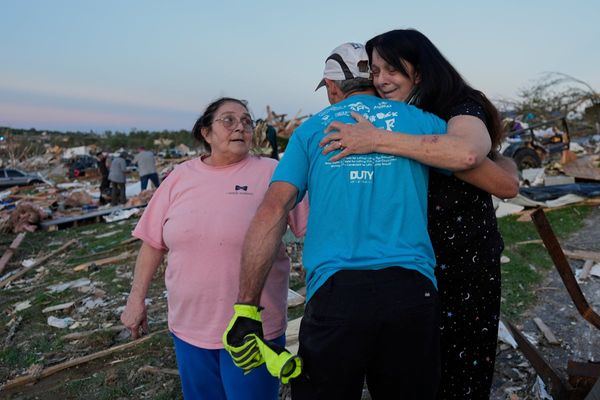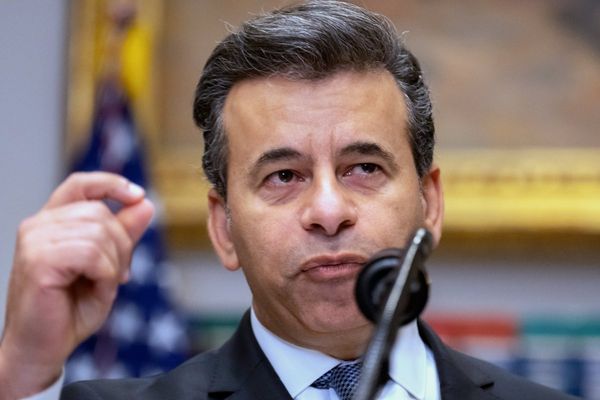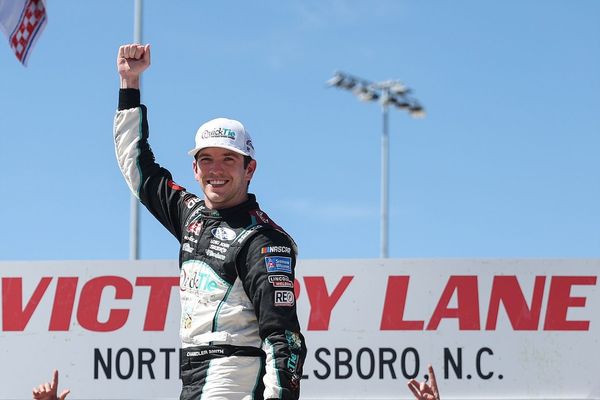
They were the young, deeply in love autistic couple who inspired the TV series that has become an international phenomenon.
But six years on, Ruth and Thomas Wyndham, now happily married, fear Netflix is exploiting the participants of Love on the Spectrum, which they say has morphed from groundbreaking documentary series to reality TV show.
Netflix last month launched its third season of the US version of Love on the Spectrum, a spin-off from the two highly acclaimed Australian seasons, the first of which debuted on Australia’s ABC in 2019.
By then, some ABC viewers had already been introduced to Ruth and Thomas. The couple had been dating for a year when the ABC’s now defunct Lateline program put out a call in 2016 for people with autism and people on the spectrum who were open to talking about romance, love and relationships. Ruth Garlick and Thomas Wyndham responded.
Their affectionate banter, interspersed with humour and frankness about the hurdles autistic people face on the dating scene, delighted audiences. They were clearly besotted with each other.
Three years later, the couple, who were now engaged, starred in the first episode of the show inspired by that Lateline segment. By then, creators Northern Pictures already had runs on the board with Employable Me, another successful series that followed a group of young Australians with disabilities looking for work.
By July 2020, Netflix had snapped up the rights and was distributing Love on the Spectrum globally. Northern Pictures was commissioned to make a second Australian series. Three US versions of the show followed.
Ruth and Thomas were approached by Northern Pictures to participate in the second Australian series. If they could get a wriggle on with their wedding plans so that they coincided with the filming schedule, Netflix would pay all the wedding costs.
The offer made the Wyndhams uneasy. They had believed they were participants in a documentary, and were happy to receive no remuneration for their participation. Staging their wedding for the benefit of Netflix felt too “Kardashian”, says Ruth, who communicates primarily via Instagram due to a hearing impairment.
“Filming it would have felt too structured, poised, out of my control, and in the hands of a corporation whom I didn’t want to share a big event with,” she says.
“There are some things in life that I don’t need to share with the whole world.”
When the third season of the US series premiered on 2 April, it ranked in the global Top 10 for two weeks. The previous season won Emmy awards for directing and casting – both in the reality TV, not documentary, category.
As promotions for the third US series had ramped up, posts on social media began questioning why Netflix was advertising the series as reality TV. And asking, if it was no longer of the documentary genre, why were the participants of Love on the Spectrum still receiving no payment for their appearances?
In the realm of reality TV, remuneration can vary significantly.
In another Netflix series following the lives of singles looking for love who are not neurodiverse, participants were paid appearance fees of $US1,000 per week, according to a lawsuit brought against the streamer by a former Love Is Blind cast member, Jeremy Hartwell, over conditions on the show. (He eventually settled with Netflix for a reputed $US 1.4m.)
Nathan Favro, a former contestant on another Netflix reality show, Byron Baes , told the Daily Telegraph: “We were paid handsomely, Netflix look after you.”
Some cast members of Netflix’s The Real Housewives of Beverly Hills reputedly earn six-figure salaries.
Netflix declined to respond to the Guardian’s questions about nonpayment to Love on the Spectrum cast members, or why the show was now being categorised by the streamer as reality TV.
Netflix’s Australian collaborator for the series, Northern Pictures, was more forthcoming.
“The focus has always been on respectful, authentic storytelling to help people on the autism spectrum find love – not on performance, competition, or spectacle – and we’re committed to maintaining that integrity in every stage of production, even as its popularity grows,” a Northern Pictures spokesperson said in a statement.
When asked why cast members are not paid a fee, the spokesperson responded, “Love on the Spectrum is built on consent, collaboration, and respect”.
“We have always covered participants’ expenses to ensure that no-one is financially disadvantaged for being involved.”
Northern Pictures also rejected the reality TV label.
“We’ve intentionally kept the same director, crew size, and editors across the series to preserve the tone since it first launched. ‘Love on the Spectrum’ remains authentic, unscripted, and participant-led – always – with the primary goal to help participants find love.”
The spokesperson said the company respected Ruth and Thomas’s decision to keep their wedding private.
Thomas says the original series was pitched to them as a documentary series about people with autism and relationships.
“And I think they’ve done a decent job of showing Ruth and my relationship. But I think the rest of the first season was sitting on the fence between a documentary series and a reality TV program and I think come season two, it definitely leaned heavily that way. We lost interest after that.”
While the couple attempted to return to normal life after their brief time in the spotlight, it took much longer to psychologically heal, they say, from online bullying.
“Autistic people can be naive and overly trusting … so I think we all were rather unprepared for the storm that followed – both the good and bad,” says Ruth.
Northern Pictures said duty of care was “a cornerstone” of Love on the Spectrum. “Participants are offered access to a qualified psychologist, during filming and after broadcast, and are provided with social media training with guidance on privacy settings and how to manage or limit online engagement.”
“While no production can eliminate all risks that come with public life, Love on the Spectrum has been designed with care, consultation, and respect at its core,” the spokesperson said.
The Wyndhams say they received no advice or support on how to navigate negative feedback on social media after the first season went to air, nor were they offered psychological assistance.
“Celebrity culture is extremely toxic, and when you put people in the public eye who may be easier to manipulate without giving them some help or guidance to navigate all of this, it can be downright dangerous,” says Ruth.
“If [participants] choose to do the show, that’s their choice. The online abusers can frankly fucking shove it. But in Australia, Love on the Spectrum was shown as a doco on free-to-air TV before Netflix bought it. Now that Netflix owns it, I think they could stand to pay us.”







